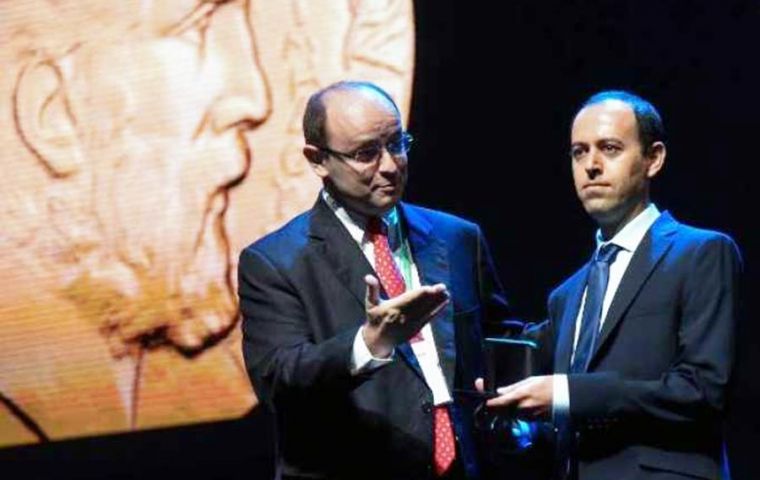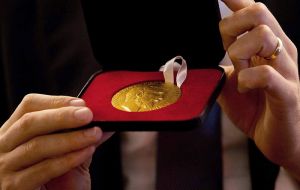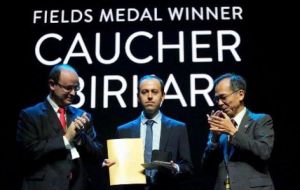MercoPress. South Atlantic News Agency
Winner of Math's' Nobel enjoys gold medal for fifty minutes, in crime-ridden Rio
 Caucher Birkar, a Kurdish refugee turned Cambridge University math professor, was among four winners of the prestigious Fields Medal in Rio de Janeiro
Caucher Birkar, a Kurdish refugee turned Cambridge University math professor, was among four winners of the prestigious Fields Medal in Rio de Janeiro  Less than an hour had passed since Birkar, a specialist in algebraic geometry, had been handed his 14-karat gold medal when his briefcase went missing
Less than an hour had passed since Birkar, a specialist in algebraic geometry, had been handed his 14-karat gold medal when his briefcase went missing  It was an embarrassing debut for crime-ridden Rio, the first Latin American city ever to host the Fields ceremony, which takes place every four years
It was an embarrassing debut for crime-ridden Rio, the first Latin American city ever to host the Fields ceremony, which takes place every four years One of the winners of the award known as the Nobel Prize for mathematics had his gold medal stolen minutes after it was given to him. Caucher Birkar, a Kurdish refugee turned Cambridge University math professor, was among four winners of the prestigious Fields Medal on Wednesday in Rio de Janeiro.
It was an embarrassing debut for crime-ridden Rio, the first Latin American city ever to host the Fields ceremony, which takes place every four years. Less than an hour had passed since Birkar, a 40-year-old specialist in algebraic geometry, had been handed his 14-karat gold medal when his briefcase went missing.
The organizer behind the event, the International Congress of Mathematicians, said it “profoundly regrets” the incident. The group said in a statement that images from the event were being analyzed and that officials were cooperating with local police.
Birkar celebrated his achievement as a fairy tale come true for the often-beleaguered Kurds. He said he hoped “this news will put a smile on the faces of those 40 million people.”
Birkar was born in a village in the ethnic-Kurdish province of Marivan, near the Iran-Iraq border. “Kurdistan was an unlikely place for a kid to develop an interest in mathematics,” he said.
But he went from Tehran University, where he recounts having looked up dreamily at portraits of past Fields winners, to get political asylum and citizenship in Britain. He established himself as an exceptional mathematical mind.
“To go from the point that I didn't imagine meeting these people to the point where someday I hold a medal myself — I just couldn't imagine that this would come true,” Birkar said. The Fields Medal recognizes the outstanding mathematical achievements of candidates who were under 40 years old at the start of the year.
At least two and preferably four people are honored each time. In 2014, Maryam Mirzakhani, from Iran, became the only female winner of the award; she died in 2017.
Another of Wednesday's four co-winners, Italy's Alessio Figalli, also had an unlikely start to academic superstardom. It was for very different reasons than Birkar.
“Until high school, his only concern was playing football,” the International Congress of Mathematicians said in its announcement of the prizes. That changed after Figalli entered the International Mathematical Olympiad.
It awakened a fascination for math that today has seen him become a leader in calculating variations and partial differential equations. Figalli, now 34 and at the university ETH Zurich, jokes that the one equation still baffling him is how to spend more time with his professor wife.
“I have work for the next 30 or 40 years. But there is one problem I really hope to solve soon: that is me and my wife living in the same city,” Figalli said.
Germany's Peter Scholze was awarded the Fields Medal for his work in arithmetic algebraic geometry. He said there'll never be an end to the challenges he faces.
“There are an infinite number of problems,” said Scholze, who is at the University of Bonn and is only 30 years old. “Whenever you solve a problem, there are 10 more coming.”
The fourth laureate, Akshay Venkatesh, is an Indian-born, Australian-raised prodigy. He began his undergraduate degree in mathematics and physics at the University of Western Australia when he was just 13.
Now 36 and at Stanford University in the United States, Venkatesh specializes in number theory. He describes his work in terms more often associated with the artistic fields.
“A lot of the time, when you do math, you're stuck. But you feel privileged to work with it: you have a feeling of transcendence and feel like you've been part of something really meaningful,” Venkatesh said.




Top Comments
Disclaimer & comment rulesCommenting for this story is now closed.
If you have a Facebook account, become a fan and comment on our Facebook Page!